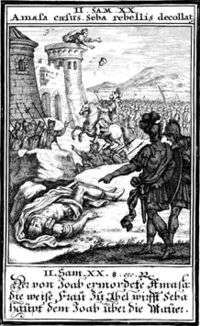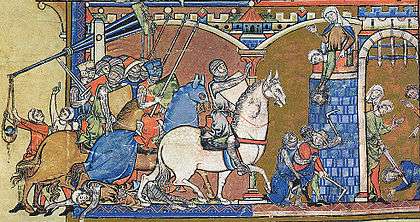Sheba son of Bichri
In the Old Testament Sheba led a revolt against King David, recounted in 2 Samuel 20 (not to be confused with the Queen of Sheba).

In the Bible
Sheba was a son of Bichri, of the family of Becher, the son of Benjamin, and thus of the stem from which Saul was descended.

When David returned to Jerusalem after the defeat of Absalom, strife arose between the ten tribes and the Tribe of Judah, because the latter took the lead in bringing back the king. Sheba took advantage of this state of things, and raised the standard of revolt, proclaiming, "We have no part in David." With his followers he proceeded northward. David seeing it necessary to check this revolt, ordered Abishai to take the gibborim, "mighty men," and the body-guard and such troops as he could gather, and pursue Sheba. Perceiving Amasa to be delaying his pursuit of Sheba, David appointed Abishai and Joab to join the expedition. Having treacherously put Amasa to death, Joab assumed the command of the army.
Joab and Abishai arrived in the North of the nation at the city of Abel-beth-maachah, where they knew Sheba to be hiding. They besieged the city. An unnamed wise woman from the city convinced Joab not to destroy Abel Beth-Maacah, because the people did not want Sheba hiding there. She told the people of the city to kill Sheba, and his head was thrown over the wall to Joab.
In the Talmud
Tosefta Terumot 7:19
The rabbis debate whether it was proper under Jewish law to give up Sheba in order to save the city from Joab's army. Rabbi Simeon ben Johai said giving up Sheba is forbidden. Rabbi Judah bar Ilai said the wise woman acted properly because Joab had the city surrounded. Everyone in the city would be killed including Sheba so it was better to give up Sheba and save everyone else.[1]
This story served as the source for the subsequent halachic discussion whether it is permissible for a group or community to save itself by sacrificing an individual. The Tosefta establishes the principle that we may not save a community by sacrificing an individual, unless the original demand was for a specified individual. R. Shimon b. Lakish adds the condition that the specified individual be deserving of death because of a crime he committed.[2]
Sanhedren 101b
"A Tanna taught: Nebat, Micah, and Sheba the son of Bichri are one and the same." The three interpreted signs and portents to mean that they would reign. "Three beheld but did not see."[3]
References
- ↑ "Jewish Philosophy: An Historical Introduction". By Norbert M. Samuelson, p. 121.
- ↑ "Extradition in Jewish Law". by Prof. Menachem Elon.
- ↑ "Sanhedrin 101b". The Babylonian Talmud.